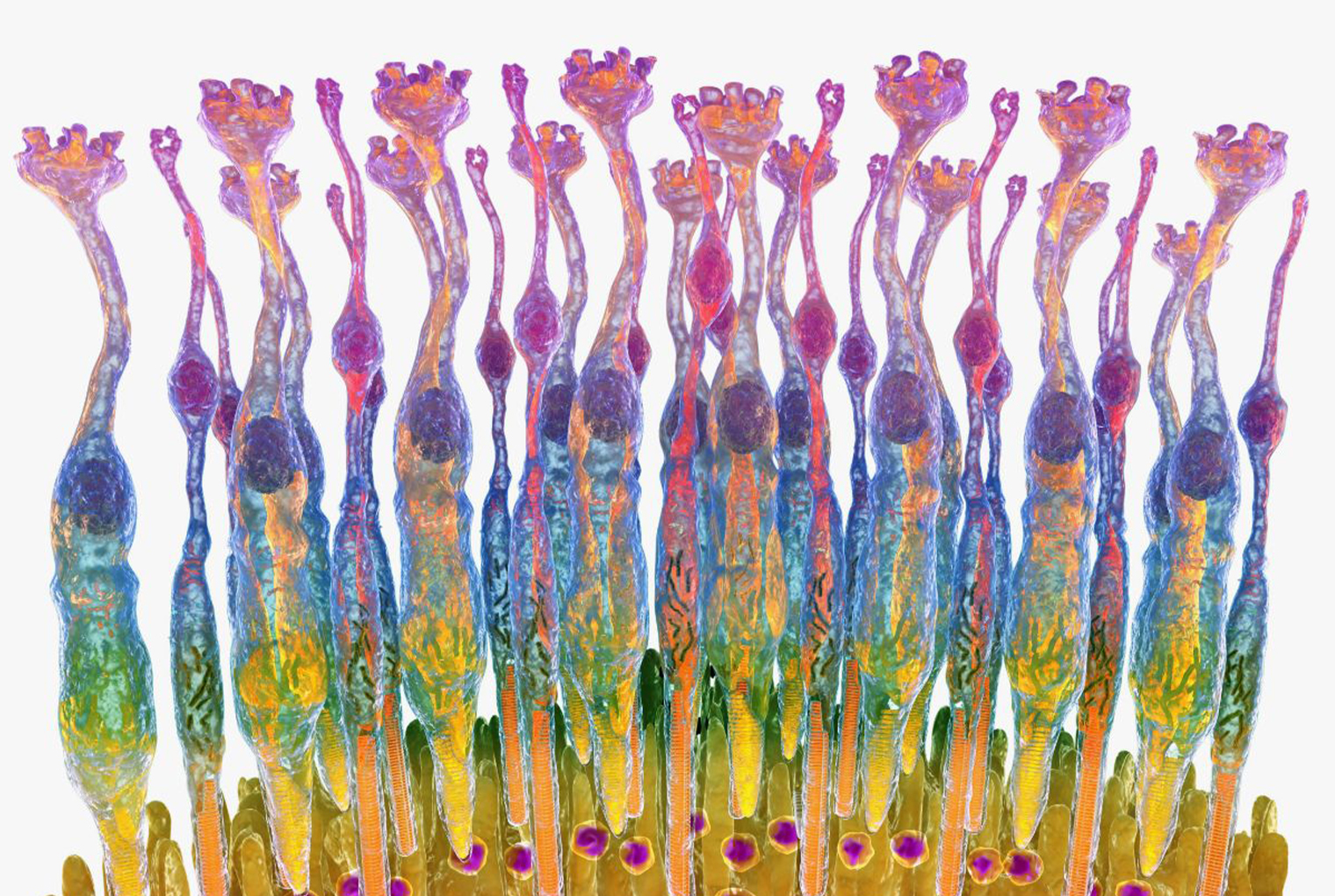 The retina, the tissue layer at the back of the eye, is essential for vision. This illustration shows the retina’s two specialized types of nerve cells for detecting images—the rods and cones. The highly sensitive rods are topped by flower-like shapes that respond to dim light. The tips of the cones, the other thin cells in the illustration, are responsible for color vision. The rods and cones enable vision by converting light into neural signals that pass through the optic nerve to the brain.
The retina, the tissue layer at the back of the eye, is essential for vision. This illustration shows the retina’s two specialized types of nerve cells for detecting images—the rods and cones. The highly sensitive rods are topped by flower-like shapes that respond to dim light. The tips of the cones, the other thin cells in the illustration, are responsible for color vision. The rods and cones enable vision by converting light into neural signals that pass through the optic nerve to the brain.
Two drugs designed by researchers at Einstein preserved vision in mice that had developed retinitis pigmentosa (RP), an inherited eye disease that can lead to blindness and for which no treatments exist. The findings were published online in July 2022 in Nature Communications.
The drugs were designed to boost chaperone-mediated autophagy (CMA), a vital “housekeeping” process in cells that disposes of unwanted proteins but becomes less efficient as people age. Ana Maria Cuervo, M.D., Ph.D., co-corresponding author of the paper, discovered CMA in 1993.
Dr. Cuervo’s research has shown that the decline in cellular cleaning is linked to Alzheimer’s and other age-related diseases. She has worked with her Einstein colleague Evripidis Gavathiotis, Ph.D., also a co-corresponding author, to develop drugs that can treat these and other diseases by revving up CMA.
Nearly a decade ago, Dr. Cuervo and colleagues found that CMA is especially important in maintaining retinal health. “So for this study, it seemed logical to see if our drugs would help against RP,” Dr. Cuervo says. “It’s the most common inherited disease of the retina, affecting one in 3,500 Americans, and there isn’t yet a cure.”
In key experiments involving a mouse model of RP, the drugs were injected intravitreally—directly into the jellylike fluid at the back of the eye—which is the preferred route for administering most eye-related drugs. One week later, the mice received electroretinograms, diagnostic tests that measure the electrical activity of the retina in response to a light stimulus. The electroretinogram results indicated that the drugs had preserved visual function in the RP mice. (See “Einstein Image.”)
“Our findings in mice strongly suggest that these drugs will be able to help people with RP as well,” says Dr. Gavathiotis. “The same molecular glitch that depresses CMA activity in mouse retinas is also present in the retinal cells of many RP patients.”
Dr. Cuervo is a professor of developmental and molecular biology and of medicine, the Robert and Renée Belfer Chair for the Study of Neurodegenerative Diseases, and co-director of the Institute for Aging Research at Einstein.
Dr. Gavathiotis is a professor of biochemistry and of medicine at Einstein and a co-leader of the Cancer Therapeutics Program at the National Cancer Institute–designated Montefiore Einstein Cancer Center. The third co-corresponding author was Patricia Boya, Ph.D., of Centro de Investigaciones Biológicas Margarita Salas in Madrid, Spain.